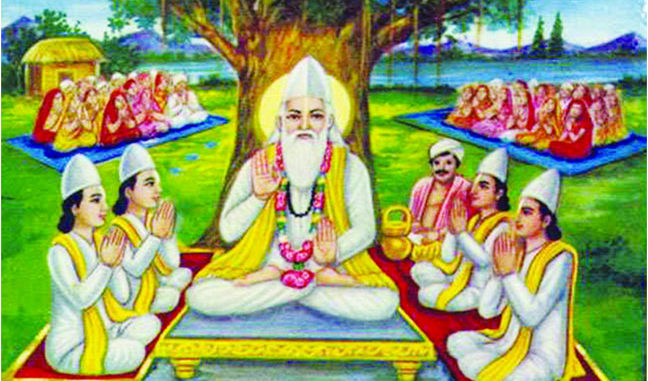
Sant Kabirdas (1440-1518 circa) was a famous poet, saint and social reformer of India. His writings have greatly influenced the Bhakti movement. Kabir Panth which is a religious community recognizes him as its founder and its members are known as Kabir Panthis, the followers of Saint Kabirdas.
His writings include Bijak, Sakhi Granth, Kabir Granthawali and Anurag Sagar. The major part of Kabir’s work was collected by the fifth Sikh Guru, Guru Arjan Dev, and incorporated into the Sikh scripture Guru Granth Sahib. The hallmark of Kabir’s work consists of his two line couplets, known as Kabir Ke Dohe.
The birth anniversary of Sant Kabir is observed on Jyeshtha Purnima as per Hindu lunar calendar.
Sant Kabir is considered to be one of the greatest poets as well as mystics ever born in India. He believed that human beings are equal and being one with God is the ultimate aim of every individual. His love and devotion towards the Supreme One clearly reflects in his poetry. The Holy Guru Granth Sahib contains over 500 verses by the great saint, Kabir. The verses or dohas of Guru Kabir are still read by people with awe and admiration. Read on to explore the biography of Sant Kabir further.
Early Life
As per the life history of Saint Kabir, he was born in 1398 AD. It is said that he was found floating on a lotus leaf in a tank in Benaras by a Muslim weaver. The weaver took the vulnerable child under his care and following the traditional manner, gave him the name of ‘Kabir’, meaning ‘the great one’. Even at a young age, Kabir displayed enormous spiritual talent.
Meeting his Guru
Kabir always wanted to become a disciple of Ramanand. However, since he was a Muslim, it was next to impossible for him to get initiation from a Hindu. So, he took recourse to a trick. Ramanand daily went to the bathing ghat for his pre-dawn ritual ablutions. Kabir lay on the steps of the ghat in such a way that Ramanand stepped on him. Shocked at this incident, he chanted ‘Rama! Rama!’. Kabir said that since he had received teachings from him, in the form of the words ‘Rama! Rama!’, he was Ramanand’s disciple. Impressed with the intelligence of Kabir, Ramanand took him as his disciple.
Guru Kabir ke Dohe
The hallmark of Kabir’s works consists of his two line couplets, known as the ‘Kabir ke Dohe’. The Dohas reflect the deep philosophical thinking of the poet saint.
Philosophy
Sant Kabir believed in the Vedantic concepts of atman. He always advocated the Impersonal Aspect of God (Nirguna) and therefore, was against idol worship. As per his view, all human beings are equal and the societal caste system that is so widely prevalent in our country is fallacious. He said that true guru is the one who can be attained through direct experience. The common ways of realizing God, like chanting, austerities, etc, are worthless.
Teachings
Kabir spent much of his time in the company of Hindu ascetics, saints and Muslim sufis. So he imbibed the tenets of both the religions and realized the best of both. Allah and Ram were but names of the same God. He was to be found neither in temples nor in mosques, neither in Benares nor in Mecca but only in the heart of a true devotee.
Kabir’s philosophical tenets were extremely simple. He was known as the guiding spirit of the Bhakti Movement. He preached Bhakti or ‘Devotion’ through the medium of his ‘Dohas’. Kabir’s Dohas touched everybody’s heart and he was endeared by all. Following are the aspects on which kabir has expressed his ideas;
Love
Love for all was Kabir’s principal tenet. He emphasized that love was the only medium which could bind the entire human kind in an unbreakable bond of fraternity. Kabir detested the frivolities and rituals in Hinduism and Islam for, these could never bind together mankind. Hence he advised all to give up hatred and perpetuate love for one and all.
God
God was the focal point of Kabir’s religion and Kabir addressed him in different names. In his opinion God alone was Ram, Rahim, Govind, Allah, Khuda, Hari etc. But for Kabir, ‘Saheb’ was his favorite name. He said god was everywhere and His domain is unlimited. God was pure, sacred, existing, without form, light, endless and inseparatable. Hence God was all powerful and he could only be worshipped through love and devotion. In whatever name one addresses Him, God is one and has no second. Hence Kabir preached Monotheism.
Teacher
In Kabir’s dictum the Teacher or ‘Guru’ has been accorded the prime position. The teacher according to him was the incarnation of God. Kabirs had this realization only when he came in contact with Ramananda. It was the guidance of a teacher that led man in the proper direction and helped him in developing the right insight.
The Path of Bhakti
Kabir stressed that the only way to attain God was through the path of Bhakti. Intense love and devotion would surely lead one to the ultimate attainment of Godhood. Total submission at His feet helps one to reach him and this should be the ultimate goal of all was what Kabir emphasized. For this no rituals or ceremonies were needed, only purity of heart and unflinching devotion were the two essentials. Hence Kabir advised his followers to attain Godhood through the path of Bhakti.
Soul
Matters relating the soul were an integral part of Kabir’s spiritual messages. Soul according to him was life, breath and knowledge. It was a part of the ‘ultimate knowledge’. The soul itself was the creation and it also was the creator. It was also the knowledge and the knowledgeable. The soul was the creator of all things, it also was the destroyer. In Kabir’s opinion cows may be of different colours but milk was the same.
Hence, though different ideas and thoughts may be merging together, soul remained the same. Soul was one, inseparable and self-creating. It was the greatest creation of God. Kabir propounded many different views on soul. Hence it became very difficult to have an exact defamation of the soul.
Impermanence of the world
Kabir asserted the impermanence of all things in the world. All living and non living things like insects, animals, trees, rivers, mountains and human beings are only temporary and all would cease to exist some day. He advised his followers not to lament the death of something which was bound to die. Hence he emphasized that in this impermanent world, the only truth and permanent reality was God, who could be attained thought Bhakti.
Salvation
Liberation or salvation was another contention of Kabir. Liberation implied freedom from the pangs of life and death. Liberation according to him was a state of “fearlessness”. By citing an example he said just as water flows out of a hole in a pot and mixes with the water outside, similarly, after death the individual soul moves out of the gross body to merge with the cosmic soul. This is liberation.





Be the first to comment